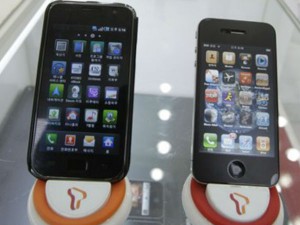Blockbuster Apple-Samsung trial packs US court

In this April 19, 2011, file photo, Samsung Electronics’ Galaxy S, left, and Apple’s iPhone 4 are displayed at a mobile phone shop in Seoul, South Korea. Observers and lawyers packed a California courtroom Monday, July 30, 2012, for the blockbuster patent trial involving the two technology titans Apple and Samsung. Apple Inc. filed a lawsuit against Samsung Electronics Co. last year alleging the world’s largest technology company’s smart phones and computer tablets are illegal knockoffs. Samsung countered that it’s Apple that is doing the stealing. AP PHOTO/AHN YOUNG-JOON
SAN JOSE, California—Observers and lawyers packed a California courtroom Monday for the blockbuster patent trial involving two of the world’s technology titans, Apple and Samsung.
Before proceedings began, a line packed with dozens of people stretched far outside the federal courthouse in San Jose, California, in the heart of Silicon Valley.
With the courtroom at capacity, some journalists were required to sit in an overflow room to watch pre-trial proceedings by video ahead of planned jury selection.
Lawyers for Samsung asked US District Judge Lucy Koh to set last-minute limits on what Apple attorneys can present to jurors during opening statements.
A 10-person jury was to be selected Monday, followed by opening arguments.
Apple is seeking more than $2.5 billion in a case accusing the South Korean firm of infringing on designs and other patents from the iPhone and iPad maker.
Samsung counters that Apple infringed on its patents for wireless communication, so the jury will sort out the competing claims.
This is one of several cases in courts around the world involving the two big electronics giants in the hottest part of the tech sector, tablet computers and smartphones.
While the results so far have been mixed in courts in Europe and Australia, Samsung is clearly on the defensive in the US case.
Koh, who will preside in the jury case, has issued two temporary injunctions against US sales of Samsung’s 10-inch Galaxy tablet and the Galaxy Nexus smartphone developed with Google.
To make matters worse, a magistrate in the case ruled last week that Samsung failed to retain key evidence in the case by allowing e-mails to be destroyed after learning of the lawsuit.
That will mean Judge Koh can issue an “adverse inference” instruction to the jury.
R. Polk Wagner, a professor of patent law at the University of Pennsylvania, said the case is probably the biggest patent trial since the 1980s case involving photo giants Polaroid and Kodak, and is important because of its size and ability to set precedent.
“I see this as the first in what I expect to be many cases involving smartphone technology,” he told AFP.
“It remains to be seen what the impact will be even if Apple wins. Typically the patents are relatively easy to design around. So if Samsung loses a couple of rounds they may still be able to make their phones.”
But Samsung could face big risks: If Apple wins, it would automatically get a permanent injunction on sales of Samsung devices. And if Samsung makes only minor changes, Apple could ask for the Korean firm to be held in contempt.
The case has huge financial implications for both firms and the burgeoning industry for mobile devices.
A survey by research firm IDC showed Samsung shipped 50.2 million smartphones globally in the April-June period while Apple sold 26 million iPhones. IDC said Samsung held 32.6 percent of the market to 16.9 percent for Apple.
Samsung is the leading maker of smartphones using Google’s Android operating system, which has become the most popular platform despite complaints from Apple that it has infringed on its patents.